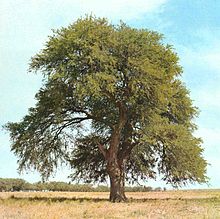Prosopis
| Prosopis | |
|---|---|
 |
|
| Prosopis caldenia, a species of central Argentina. | |
| Scientific classification | |
| Kingdom: | Plantae |
| (unranked): | Angiosperms |
| (unranked): | Eudicots |
| (unranked): | Rosids |
| Order: | Fabales |
| Family: | Fabaceae |
| Subfamily: | Mimosoideae |
| Tribe: | Mimoseae |
| Genus: |
Prosopis L. |
| Type species | |
|
Prosopis spicigera L. |
|
| Species | |
|
See text. |
|
| Synonyms | |
|
Strombocarpa |
|
See text.
Strombocarpa
Prosopis is a genus of flowering plants in the pea family, Fabaceae. It contains around 45 species of spiny trees and shrubs found in subtropical and tropical regions of the Americas, Africa, Western Asia, and South Asia. They often thrive in arid soil and are resistant to drought, on occasion developing extremely deep root systems. Their wood is usually hard, dense and durable. Their fruits are pods and may contain large amounts of sugar. The generic name means "burdock" in late Latin and originated in the Greek language.
Prosopis species have been found to contain 5-hydroxytryptamine, apigenin, isorhamnetin-3-diglucoside, l-arabinose, quercetin, tannin, and tryptamine.
The tannins present in Prosopis species are of the pyrogallotannin and pyrocatecollic types. The tannins are mainly found in the bark and wood while their concentration in the pods is low.
Some species, such as P. africana or P. velutina, produce a gum (mesquite gum).
...
Wikipedia
